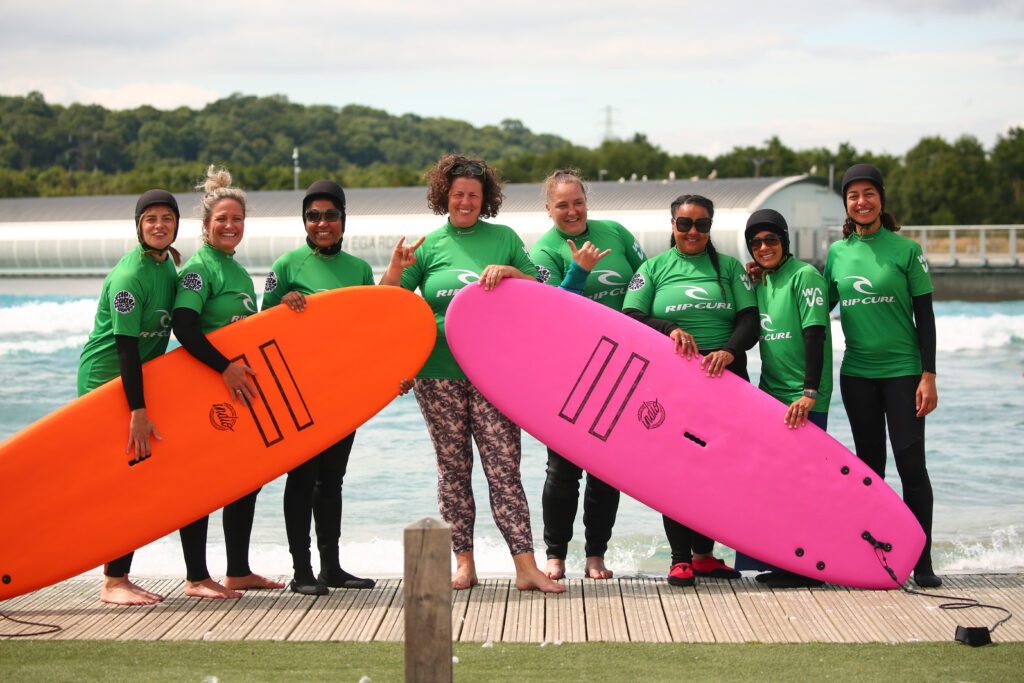Bristol student rides wave of academic success with study showing surfing boosts mental health

Pioneering research showing the mental health benefits of surfing by a University of Bristol student has led to an exciting partnership with The Wave to expand the study. The research is the first of its kind to be carried out at an inland surfing facility.
Ariane Gerami created a unique ‘virtual surf booth’, which captured responses on video, to accurately assess the experiences of a group of women who took part in a six-week surf course at the ‘slice of the ocean’ on the outskirts of the city.
Results showed the women’s mental wellbeing significantly improved and various benefits were reported, including reduced anxiety, having more confidence, and feeling positive.
The novel research, which formed the thesis for Ariane’s Master’s degree in Nutrition, Physical Activity, and Public Health, went on to be published in an international academic journal and The Wave has now committed to supporting a three-year PhD study led by Ariane to scale up the findings.
Ariane, aged 41 said:
“Seeing this research project scale such amazing new heights is like a dream come true. Watching the participants smiling and growing in confidence with each surf session was a really rewarding experience and it was also a powerful illustration of what surfing can bring to mental wellbeing. I’m looking forward to building on this evidence to gain a fuller understanding of the relationship between surfing and mental health, and the potential wider advantages of this invigorating physical activity.”
The research programme will explore the mental health impact of being in water and waves among larger groups of women and men.
The pilot study involved 15 women, who used an online tool to capture their experiences and feelings which generated scores in mental wellbeing at the start and end of the surfing course. VideoBooth Systems and Bristol-based organisations, ActiveBeing, AID Box Community, and Open Minds Active helped the project come to fruition.
Charlie Hartley-Hodge from ActiveBeing comments:
“The surfing sessions had a significant impact on myself and the group of women who were part of this project. Having the space each week to be free of thought and demands of day-to-day life has been invaluable. To simply focus on the water, trying to be on the board, supporting the women around you, laughing and connecting has been uplifting for everyone involved.
“The impact on mental wellbeing has been clear for all participants; the sense of achievement, boost in self-esteem, confidence, happiness, connecting with the water, the light and each other means that we would walk away feeling refreshed and having had space for ourselves and for our brains to be purely in the moment.”
Sara Ahmed-Qureshi from Open Minds Active was also part of the research group. She said:
“Surfing left me feeling energised and upbeat. I found myself in a happier and positive mood, with more energy to do those boring mundane jobs. I also felt kinder and more loving towards others. It was a pleasure to help Ariane carry out her research, and to know it was going to benefit others.”
The research findings add to a growing body of evidence highlighting the mental health benefits of activities in blue and green spaces. Surf therapy is increasingly used as a health intervention globally – with some courses, such as those offered by The Wave Project, being available via social prescribing.
Nick Hounsfield, Founder of The Wave, said:
“The power of water and waves to make us feel better is at the heart of why The Wave exists. It is so important for us to support the growing body of research looking at blue health and particularly the positive mental health impact of surfing and blue spaces. These initial findings are exciting, and we can’t wait to work with the University of Bristol to enable even more extensive research in this area.”
Ariane’s tutor Dr Joey Murphy, Lecturer in Physical Activity and Public Health at the University of Bristol, said:
“This research was a pleasure to be a part of and I believe the findings can help aid future data collection for activities held in blue spaces such as surfing. I hope this study can help to advocate for more research looking at the potential health benefits of surfing, including the mechanisms through which they happen. Inland facilities, such as the Wave, increase the accessibility of surfing meaning the benefits of engagement with blue space can reach a wider range of population groups. This provides a unique opportunity to work in partnership and co-create evidence which can help benefit the health of wider communities.”